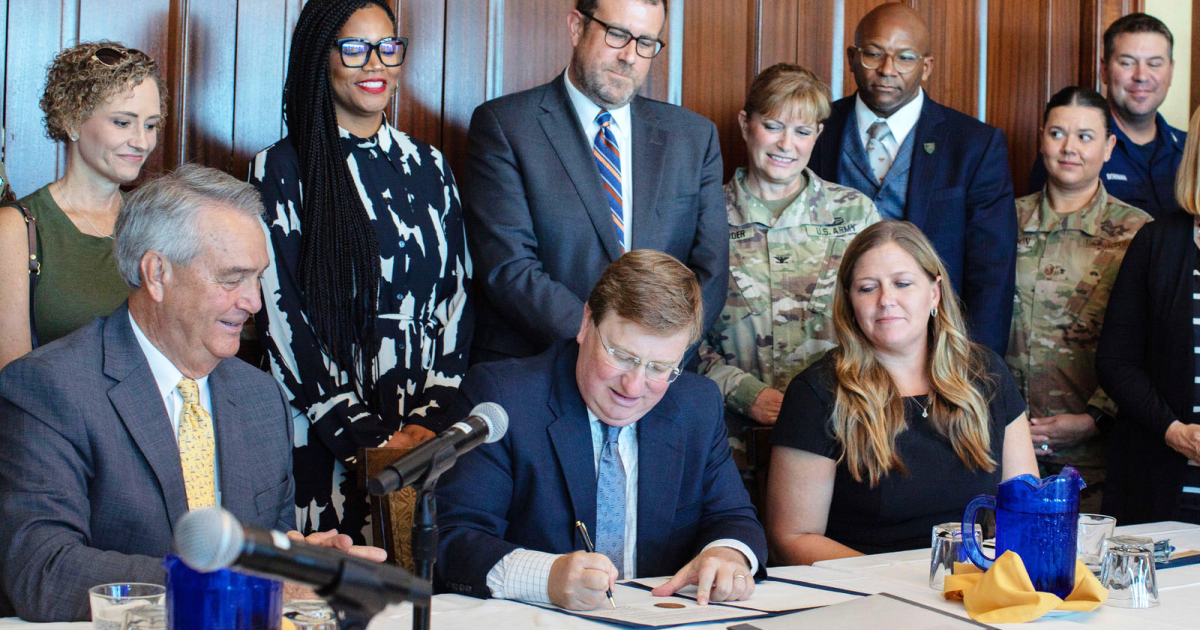4 MIN READ
ASPIRE Coalition Launch: Military Organizations Solving Military Reciprocity Challenges

Laura Schmiegel was attending the University of Michigan Law School when she met her husband, who was serving in the military. After she graduated in 1996, they relocated interstate four times within six years of her husband’s service. Each time she moved, she would study for her new state’s bar exams (given only twice a year), with little time to practice before the inevitable next transfer. Eventually, she gave up the career she had tirelessly spent seven years building.
This story is all too common for military spouses, as explained at our launch of the Alliance for States Providing Interoperable Reciprocity (ASPIRE) at the National Press Club in Washington, D.C., on October 19, 2022. ASPIRE is a broad coalition of mission-driven advocates, non-profit organizations, elected officials, and business owners committed to eliminating barriers to interstate professional and occupational license transfer for military spouses.
Years later, in 2009, Laura Schmiegel gathered close friends in similar situations and founded Blue Star Families – an organization committed to strengthening military families by connecting them with communities of mutual support. Blue Star Families is one of the many meaningful organizations involved in our ASPIRE coalition.
Constituents and officials support better serving military spouses and veterans
Former Governor of Maryland Martin O’Malley opened the launch speeches with a story from his days in office when he was at the White House, met by Michelle Obama and Dr. Jill Biden. “Their message to us was this: we need to do better by our veterans and our families and spouses of veterans when it comes to allowing them to become fully and gainfully employed when one of them is transferred because of their military service.”
Steve Claremont, CEO of Change of Research, reiterated the widespread support for military reciprocity with recent survey findings:
- 90% agreed that, given inflation, we need to make it easier for military spouses to get a job
- 83% support military families using their licenses to be able to work right away
- 59% would vote for a candidate who supports allowing reciprocity
Common employment challenges for military families
A fourth-generation veteran, proud son of a marine, and former West Point graduate, Terron Sims II, gave insight on his experience navigating the challenges that come from military reciprocity during the speaking lineup:
“I attended nine schools from kindergarten to ninth grade, and I can attest to the need for reciprocity, especially for our military spouses. When my family was stationed in New Orleans, it took my mom several months to find employment. She took that life lesson learned. When my dad took command at Camp LeJeune three years later, we remained in Northern Virginia because my mom had a job as an accountant in a company that she very much liked. As far as she was concerned, moving to North Carolina was not an option because she could not afford to interrupt her employment.”
— Terron Sims, U.S. Army Veteran & Merit Advisor
This universal challenge for military spouses seeking consistent employment impacts their ability to receive a steady income and creates stressful circumstances for their families. Today, Sims II works alongside other coalition members to organize and advocate for military reciprocity with governors, chiefs of staff, secretaries and commissioners of veterans affairs, and subject matter experts to solve the problem that affects many military spouses and veterans annually.
Military reciprocity supports economic empowerment
Another key speaker was Ginger Miller, Founder and CEO of the Women Veterans Interactive Foundation and a disabled veteran. Her touching story uncovered her struggle working three jobs to make ends meet after being medically discharged from the military, while her husband suffered from PTSD.
“If you don’t work, you don’t eat. Merit, what you’re doing right now is making it easier for us who have worn the uniform and our spouses to get those jobs we need to feed our families. It’s not just about the jobs. It’s not just about the licenses. It’s about our families.”
— Ginger Miller, Women Veterans Interactive Foundation
We proudly partner with technology providers to connect military families with their desired employment opportunities and help people like Ginger Miller and Laura Schmiegal gain easy access to transferable digital licenses for employment.
Technology can solve military reciprocity challenges
Though 16 states have passed measures that mandate or enable reciprocity for military families, no central platform has existed — until now — to promote interstate recognition and cooperation. Merit Co-founder and CEO, Tomer Kagan, explained how the verified identity technology the company provides helps ensure integrity and accountability for military reciprocity:
“We are one nation. We have one armed force of people that come from 50 different states. Those people don't serve in that state's military. They serve in the United States military. The least we can do is help ensure that their families feel they're part of the United States, and don't have to reapply in every state they move to.”
“The technology to do this exists. We know because we've built it. What remains now is the will to finish this — take these programs, and instead of making people's lives harder, make people's lives better.”
—Tomer Kagan, Merit CEO
The verified identity platform works as a digital wallet for military spouses and veterans for interoperable license sharing, making it easier for them to return to work and increase economic resilience after moving.
Transferable digital licenses empower:
- Military families - The ability to easily transfer professional and occupational licenses significantly reduces stress and anxiety felt by families who struggle financially with each move.
- Employment agencies - Schools, healthcare systems, businesses, and organizations can efficiently hire skilled professionals and close employment gaps.
- Active or aspiring elected public servants - Elected officials can confidently support interstate license reciprocity because most constituents do, regardless of their political affiliation.
The official ASPIRE launch at the National Press Club was a sentiment to the power of personal storytelling in meaningful places. Our allies and members shared their perspectives on navigating the complications and burdens of military reciprocity. We at ASPIRE Coalition continue working with like-minded advocates to combine licensing portability legislation with a digital platform for interoperable, verified credentials, resulting in less lost income, less financial insecurity, and more military families staying together.
Watch the full video of our launch and discover why and how organizations are supporting this important cause:


.png)

